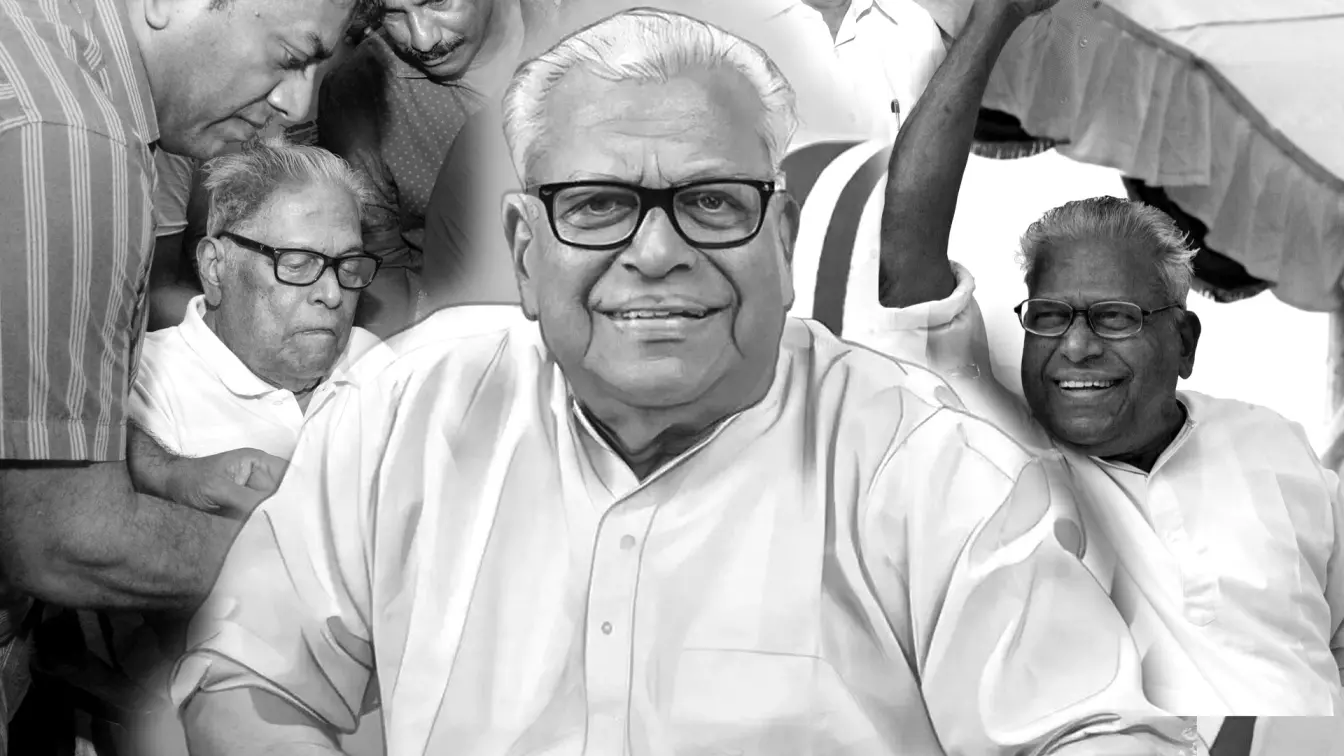
Why VS Achuthanandan was Kerala’s moral compass: MG Radhakrishnan
In this conversation with senior journalist MG Radhakrishnan, The Federal traces the many shades of VS — from party loyalist to internal dissenter, agitator to CM

Kerala bid farewell to one of its tallest leaders, VS Achuthanandan, who passed away at the age of 101. A lifelong communist, VS, as he was fondly known, was more than a politician. For many, he symbolised integrity, struggle, and the soul of left politics in Kerala. In this conversation with senior journalist MG Radhakrishnan, The Federal traces the many shades of VS — from party loyalist to internal dissenter, agitator to chief minister.
What did VS Achuthanandan stand for in Kerala’s political landscape?
VS was much more than a politician. He was seen as Kerala’s moral compass at a time when political integrity was in decline nationally. His life was marked by sacrifice, agitation, and a deep commitment to uplifting the lives of common people.
Also read: Former Kerala CM V S Achuthanandan passes away
Though immensely popular, he remained a harsh internal critic of his party, the Communist Party of India (Marxist). His moral authority often came into conflict with the party’s organisational machinery.
Was he a rebel or a principled dissenter within the CPI(M)?
He was both. From his early days in Alappuzha—soon to become a red bastion—he led protests against royalty, landlords, and later corporate power. He did not hesitate to call out his own party when he saw it deviating from its principles.
He was among the 32 members who walked out of the CPI’s national council to form CPI(M). Despite being pushed to the margins in the 1990s, particularly after being denied a ticket in the 1996 elections, he fought back and reclaimed leadership status.
How did the rivalry between VS and Pinarayi Vijayan shape Kerala politics?
The rivalry was intense and prolonged. Interestingly, Pinarayi initially supported VS’s comeback in the late 1990s. But as Pinarayi grew into a strong organisational figure, VS increasingly found himself marginalised again—this time by someone he once mentored.
Also read | Achuthanandan: Farewell to world’s longest-lived card-holding communist
This led to decades of factionalism in CPI(M), with VS commanding massive public support but little institutional backing. Despite this, he continued championing causes outside the party, especially environmental protection and anti-corruption.
How did VS remain so popular despite intra-party conflicts and delays in attaining high office?
His transformation post-70s was remarkable. Once considered an orthodox apparatchik, he reinvented himself as a people’s leader. He took up issues like land encroachment, corruption, women's rights, and even free software.
As chief minister, his campaign against forest land encroachment in Munnar and action against corrupt politicians elevated him to iconic status. His late-career embrace of modern causes made him relatable to a younger generation.
Did the SNC-Lavalin case mark a turning point in his decline within CPI(M)?
Yes. The SNC-Lavalin case, in which Pinarayi was accused (and later exonerated), became VS’s rallying point against corruption—even targeting his party rival. This deepened the rift and led to both leaders being temporarily ousted from the politburo.
Though the case never legally harmed Pinarayi, it cemented VS’s outsider status within the party while reinforcing his anti-corruption credentials in the public eye.
Also read: ‘Irreplaceable loss to Party and State’: CM Vijayan’s tribute to VS Achuthanandan
What made him such a unique figure among Indian communist leaders?
He came from a background unlike most CPI(M) stalwarts—belonging to a backward caste and truly working-class roots. While many top communist leaders hailed from elite or upper-caste backgrounds, VS symbolised the class the party claimed to represent.
He merged micro-politics like environment and gender rights with the larger communist movement—something uncommon in his generation.
What was he like behind closed doors?
VS wasn’t known for intellectual flair or oratory. He lacked the humour of EK Nayanar or the charisma of AK Gopalan. Yet, his austere life, deep conviction, and unmatched perseverance made him universally respected.
Also read: VS Achuthanandan obituary: The biography of resistance
In his later years, he became the last living link to the heroic age of India’s communist movement—making him a bridge between the party’s ideological past and its evolving future.
The content above has been generated using a fine-tuned AI model. To ensure accuracy, quality, and editorial integrity, we employ a Human-In-The-Loop (HITL) process. While AI assists in creating the initial draft, our experienced editorial team carefully reviews, edits, and refines the content before publication. At The Federal, we combine the efficiency of AI with the expertise of human editors to deliver reliable and insightful journalism.

